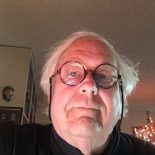Simanaitis Says
On cars, old, new and future; science & technology; vintage airplanes, computer flight simulation of them; Sherlockiana; our English language; travel; and other stuff
A SCIENCE TRIAD
ONE THING to be said for science: It certainly offers a variety of thought. Proof of this comes in every issue of Science, the weekly magazine of the American Association for the Advancement of Science.
The August 10, 2018, issue of Science is exemplary. Where else can I learn about a purloined math medal, what Stonehenge researchers do when they can’t study cremated DNA, and what molecules in a gas have in common with heavy-metal mosh pits?
The Fields Medal Caper. A mathematical counterpart of the Nobel Prize, the Fields Medal is awarded every four years by the International Mathematical Union to as many as four mathematicians age 40 or younger.
SimanaitisSays has noted two recent Fields recipients: Cédric Villani, 2010, and the late Maryam Mirzakhani, 2014.
The 2018 Fields Medal presentation took place in Rio de Janiero, with four mathematicians honored: Cacher Birkar, whose speciality is algebraic geometry; Alessio Figalli, transport theory; Peter Scholze, fractal studies; and Akshay Ventatesh, number theory, automorphic forms, and representation theory.
As reported in a News item in Science, August 10, 2018, “Minutes after Birkar received his medal, he noticed that his briefcase, where he had placed it, was missing. The briefcase was later recovered outside the ceremony venue in Rio de Janeiro, Brazil, but the medal was gone.”
Dating Cremated Bodies. Let me stress that I mean “dating” in the archeological sense. According to the same Science, August 10, 2018, researchers have identified mysterious cremated remains found under Stonehenge: “Some of these people probably came from western Wales,” Science indicates, the same location where the monument’s huge stones were quarried. “The remains were interred during the earliest stages of Stonehenge’s construction, from 3000 to 2480 B.C., according to earlier research.”
Cremation destroys any recoverable DNA, so analysis of the remains could not use this approach. On the other hand, cremation also helped researchers when they performed strontium isotope analysis of the remains: “Strontium varies depending on local geography and so can reveal where the deceased had lived in the decade or so before death.”
Such analyses can be blurred by bones absorbing additional strontium from burial soil. However, the high temperature of cremation sealed in the strontium as it was at death.
Heisenberg in the Mosh Pit. A book review in this same issue of Science contains the comment, “a refreshing and accessible introduction to nanoscience for the curious metalhead.” I believe this may be the first time that the words “nanoscience” and “metalhead” ever appeared in the same sentence. On the other hand, I have yet to read Philip Moriarty’s book.

When the Uncertainty Principle Goes to 11: Or How to Explain Quantum Physics with Heavy Metal, by Philip Moriarty, Benbella Books, 2018.
Moriarty is a professor of physics in the School of Physics and Astronomy, University of Nottingham, U.K., and also an avowed metalhead. An interesting example of this physics/metalhead confluence is cited in Turn It Up,” David J. Reilly’s book review in Science, August 10, 2018: “Distorted electric guitar sounds that define heavy metal were once a nuisance derived from the limitation of guitar amplifier technology. Now, we have software tools, running on processors built from billions of transistors, that emulate the sound of a single vacuum tube, because tubes sound better.”

“Researchers have shown that the same mathematical function can be used to describe the movement of molecules in a gas as moshers at a metal gig.” Image and caption from Science, August 10, 2018.
I’m reminded of Gottfried Wilhelm Leibnitz’s line: “Music is a calculation performed by the mind without knowing it is counting numbers.” But then, not being a metalhead…. ds
© Dennis Simanaitis, SimanaitisSays.com, 2018



